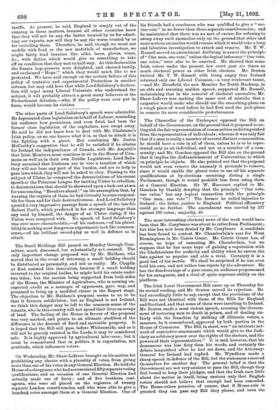The other parts of Lord Salisbury's speech were admirable. He
deprecated class legislation on behalf of Labour, reminding his audience how pernicious, and even fatal, had been the former class legislation of the capitalists, now swept away. He said he did not know how to deal with Mr. Gladstone's Irish policy, as no one knows what it is, so that to attack it is like fighting with a ghost. But combining Mr. Justin McCarthy's suggestion that he will be satisfied if he attains for Ireland the independence of Canada, with Mr. Asquith's that Irish Members must continue to sit in the House of Com- mons as well as in their own Dublin Legislature, Lord Salis- bury surmised that Irishmen are to vote a taxation of which they will not bear any part of the burden, and are to help to pass laws which they will not be asked to obey. Passing to the subject of Ulster, he compared the denunciations of his recent speech at the Primrose League for inciting Ulster to rebellion, to denunciations that should be showered upon a look-out at sea for announcing, "Breakers ahead !" on the assumption that, by warning the captain of them, he had virtually become responsi- ble for them and for their destructiveness. And Lord Salisbury quoted a very impressive passage from a speech of the late Sir Robert Peel's, which predicted in far stronger language than any used by himself, the danger of an Ulster rising, if the Union were tampered with. No speech of Lord Salisbury's was ever more characteristic,—of his rashness,—of his plausi- bility in making most dangerous experiments look like common- sense,—of his brilliant sword-play as well in defence as in attack.


































 Previous page
Previous page